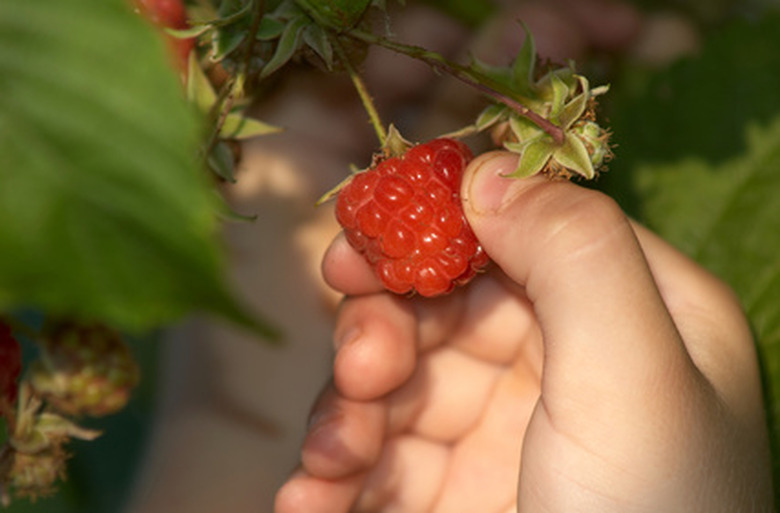How To Fertilize Raspberry Plants
Whether black, purple, red or yellow, everbearing or summer blooming, raspberries are a popular garden plant. But to produce nutritious and delicious fruit, raspberry bushes requires regular fertilization. These plants are heavy feeders because they produce their fruit on tall canes that they grow every two years. Without regular feeding, your raspberry bush may not have the energy to produce the fruit you love.
Step 1
Spread 2 oz. of a 5-10-15 granular plant fertilizer evenly over the roots of your raspberry plant two weeks after you plant it.
Step 2
Water the soil around your plant with 1 to 2 inches of water to help the fertilizer reach the raspberry plant's roots.
- Whether black, purple, red or yellow, everbearing or summer blooming, raspberries are a popular garden plant.
- Water the soil around your plant with 1 to 2 inches of water to help the fertilizer reach the raspberry plant's roots.
Step 3
Spread 1/2 cup of a 10-10-10 granular plant fertilizer evenly over the roots of your raspberry plant the following spring before the raspberry plant produces new growth.
Step 4
Water the soil around your plant with 1 to 2 inches of water to help the fertilizer reach the raspberry plant's roots.
- Whether black, purple, red or yellow, everbearing or summer blooming, raspberries are a popular garden plant.
- Water the soil around your plant with 1 to 2 inches of water to help the fertilizer reach the raspberry plant's roots.
Step 5
Continue to fertilize the raspberry plant each spring before new growth begins.
Kill Raspberry Plants
Wild and cultivated raspberries (Rubus spp.) Put the raspberry canes, stumps and roots in the trash, and fill in the hole with fresh soil. Spraying raspberry plants in fall with a systemic herbicide is an effective control. Systemic herbicides move through plants to their roots, and they move most efficiently in fall, when raspberries and other perennial plants are storing energy in their roots before winter. Put on protective clothing, and spray raspberry plants with a 2 percent ready-to-use glyphosate product on a dry, still day before the first frost, covering all the leaves and stems. Fill in the gaps with soil. After controlling the raspberry plants in your garden, check the area every month during the growing season and prune any shoots that are growing over the barrier.
- Wild and cultivated raspberries (Rubus spp.)
- Systemic herbicides move through plants to their roots, and they move most efficiently in fall, when raspberries and other perennial plants are storing energy in their roots before winter.
Kill Raspberry Plants
Wild and cultivated raspberries (Rubus spp.) Put the raspberry canes, stumps and roots in the trash, and fill in the hole with fresh soil. Spraying raspberry plants in fall with a systemic herbicide is an effective control. Systemic herbicides move through plants to their roots, and they move most efficiently in fall, when raspberries and other perennial plants are storing energy in their roots before winter. Put on protective clothing, and spray raspberry plants with a 2 percent ready-to-use glyphosate product on a dry, still day before the first frost, covering all the leaves and stems. Fill in the gaps with soil. After controlling the raspberry plants in your garden, check the area every month during the growing season and prune any shoots that are growing over the barrier.
- Wild and cultivated raspberries (Rubus spp.)
- Systemic herbicides move through plants to their roots, and they move most efficiently in fall, when raspberries and other perennial plants are storing energy in their roots before winter.
Warning
Do not fertilize raspberry plants in the late spring or summer.
References
- University of Illinois: Raspberries
- North Dakota State University: Raspberries
- Iowa State University: Proper Care of Raspberries
- University of Illinois Extension: Raspberry
- Horticulture: Getting Rid of Raspberries
- Pennsylvania State University Extension: Biennial and Perennial Weed Control Is Best in the Fall
- ZipcodeZoo: Rubus Idaeus
- ZipcodeZoo: Rubus Occidentalis
- University of Illinois Extension: Raspberry
- Horticulture: Getting Rid of Raspberries
- Pennsylvania State University Extension: Biennial and Perennial Weed Control Is Best in the Fall
- ZipcodeZoo: Rubus Idaeus
- ZipcodeZoo: Rubus Occidentalis
